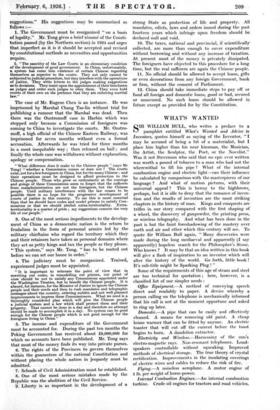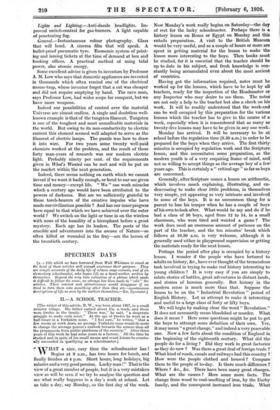WHAT'S WANTED
SIR WILLIAM BULL, who writes a preface to a pamphlet entitled What's Wanted and Advice to Inventors, quotes himself as saying of the Inventor, " I may be accused of being a bit of a materialist, but I place him higher than his near kinsman, the Musician, the Artist, the Sculptor, the Poet, or the Novelist."
Was it not Stevenson who said that no epic ever written was worth a pound of tobacco to a man who had not the wherewithal to fill his pipe ? What of the internal combustion engine and electric light—can their influence be calculated by comparison with the masterpieces of our language ? And what of motion pictures, with their universal appeal ? This is heresy to the highbrows, perhaps, but it is idle to deny that the romance of inven- tion and the results of invention are the most striking chapters in the history of man. Kings and conquests are trifles in our story compared with the first shaping of a wheel, the discovery of gunpowder, the printing press, or wireless telegraphy. And what has been done in the past is but the faint foreshadowing of the mastery over earth and air and ether which this century will see. To quote Sir William Bull again, " Many discoveries were made during the long mediaeval and apparently (I say apparently) hopeless search for the Philosopher's Stone. Who knows ? It may be that an idea written in this book will give a flash of inspiration to an inventor which will alter the history of the world. Go forth, little book ! It's sub-title might be Sparking Plug ! "
Some of the requirements of this age of steam and steel are too technical for quotation ; here, however, is a classified list of our simpler needs : Office Equipment.—A method of conveying speech direct and readably to paper. A device whereby a person calling on the telephone is mechanically informed that his call is not at the moment opportune and asked to ring up later.
Domestic.—A pipe that can be easily and effectively cleaned. A means for removing old paint. A cheap honse warmer that can be fitted by anyone. An electric toaster that will cut off the current before the toast begins to burn. A dandelion extractor.
Electricity and Wireless.—Harnessing of the sun's electro-magnetic rays. Non-resonant telephones. Loud- speakers controllable without squeaking. Improved methods of electrical storage. The true theory of crystal rectification. Improvements in the insulating coverings of electric wires and cables to reduce the risk of fire.
Flying.—A noiseless aeroplane. A motor engine of 1 lb. per weight of horse-power.
Internal Combustion Engines.—An internal combustion turbine. Crude oil engines for tractors and road vehicles. Lights and Lighting.—Anti-dazzle headlights. Im- proved switch-control for gas-burners. A light capable of penetrating fog.
General.—Instantaneous colour photography. Glass that will bend. A cinema film that will speak. A bullet-proof pneumatic tyre. Economic system of print- ing and issuing tickets at the time of demand at box and booking offices. A practical method of using tidal power, also atomic energy.
Some excellent advice is given to inventors by Professor A. M. Low who says that domestic appliances are invented in thousands which often remind one of the electrical mouse-trap, whose inventor forgot that a cat was cheaper and did not require emptying by hand. The cave man, says Professor Low, had wider scope for conquest, but we have more weapons. - Indeed our possibilities of control over the material Universe are almost endless. A single and doubtless well- known example is that of the tungsten filament. Tungsten is one of the toughest and most unmalleable materials in the world. But owing to its non-conductivity to electric current this element seemed well adapted to serve as the filament of electric lamps. The pii771e was how to draw it into wire. For two years some twenty well-paid chemists worked at the problem, and the result of these forty man-years of research was our modem electric light. Probably ninety per cent. of the requirements given in What's Wanted can be met and will be put on the market within the next generation.
Indeed, there seems nothing on earth which we cannot invent if we want it badly enough, or bend to our use given time and money—except life. " We " can work miracles which a century ago would have been attributed to the powers of darkness. But are we sufficiently grateful to those torch-bearers of the creative impulse who have made our civilization possible ? And has our inner progress been equal to that which we have achieved over the outer world ? We switch on the light or tune in on the wireless with none of the humility of a hierophant before a great mystery. Each age has its leaders. The poets of the crucible and adventurers into the arcana of Nature—so often killed or wounded in the fray—are the heroes of the twentieth century.



























































 Previous page
Previous page